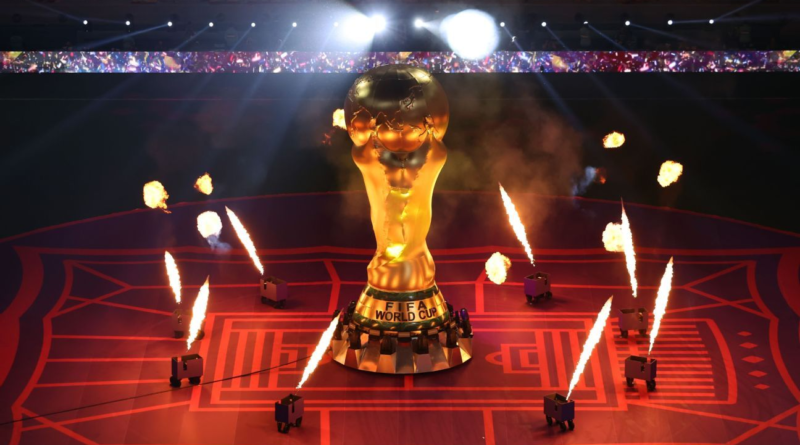Qatar vs. Ecuador makes it clear this is a World Cup like no other
AL KHOR, Qatar — There was the tainted bid vote. The convoluted date shift. The endless (and tragic) construction. The allegations of alarming human rights abuses. The fear from LGBTQ fans. The climate concerns over air-conditioned outdoor stadiums. The last-minute flip-flop on beer sales. The disturbing rant from the FIFA president in what was supposed to be his greeting.
It has been, by any measure, a preamble like nothing sports has ever seen before, a prologue that could also be its own book. But this bizarre, at times Orwellian gathering in the Arabian desert is also the biggest soccer tournament on the planet. And so it was, on Sunday night, that the games finally began.
– Report: Qatar 0-2 Ecuador | World Cup fixtures, features
The scene was, like pretty much everything else here, something familiar wrapped in something new. Royals and other VIPs arrived to watch Qatar face Ecuador with an honor guard of camels and horses lining the road. Men in white thobes and women in black abayas filed through the concourses and filled the stands. After much consternation, there was no alcohol being sold on site. The in-stadium announcements began, “Your highnesses, your eminences, ladies and gentlemen …” and the Al Bayt Stadium felt modern on the inside, but will have most of its frame dismantled and recycled once the tournament is over because it isn’t needed.
The fans still screamed, though. They still chanted. They still danced and sang. There were still giant flags and a massive replica of the World Cup trophy surrounded by a ring of fire on the field just before the game began. Drummers still pounded a thrumming beat for hours on the esplanade leading up to the gates, and when Qatar’s national anthem played, the players still pulled their shoulders back with honor.
The referee’s whistle blew. The players began to run. A roar reverberated around the stadium bowl as, for the first time, the World Cup had come to an Arab country.
“I feel proud to be the first player to captain our national team in the World Cup,” said Hassan Al-Haydos, the Qatari forward who has now made 170 appearances for his national team. “All my teammates are ready for this tournament.”
– World Cup Daily: Benzema ruled out, Infantino’s rant, beer sales on hold
This is by far the biggest stage Qatar has played on. They are the second-lowest-ranked World Cup host ever, 50th according to FIFA, behind South Africa (ranked 83rd in 2010). And the gap in talent showed as Ecuador had one goal ruled out by VAR for a very tight offside call after just three minutes and scored another on a penalty kick from Enner Valencia just 13 minutes later in their 2-0 win over the hosts.
Understandably, the home side’s players slumped a little. The Qatari supporters section behind the goal was unmoved, though, staying in full throat throughout the first half, willing its players — no matter the score — to push on.
One afternoon earlier this week, in the Doha marketplace known as the Souq Waqif, two men in traditional dress rode horses carefully among the fans and stalls. It was quaint, a scene of seeming authenticity that included — as happens with horses — a moment where one of the animals relieved itself, its droppings falling into a pile on the street.
Suddenly, a man in a gray shirt and blue pants carrying a red plastic shovel appeared out of nowhere. Within seconds of it hitting the ground, the droppings were swept into his bucket and disappeared again, expeditiously and effectively removing anything that might mar the market’s pristine appearance before anyone could notice (or could step in it). It was impressive. Unfortunately, this overarching approach has not been similarly effective in erasing the myriad other pitfalls related to the organization of this World Cup.
The list feels endless. Some issues, like the jamming of a tournament into the middle of the club season because of Qatar’s extreme summer temperatures, directly affect the players and, potentially, the play. Others are more about the fan experience: concerns from the LGBTQ community about acceptance, for example, or fan villages comprised of repurposed shipping containers, or the years-long promise to relax alcohol restrictions in this conservative Muslim nation that was abruptly reversed just two days ago.
FIFA president Gianni Infantino has continually positioned his organization as staunchly opposed to the idea that there is anything potentially wrong with Qatar or its hosting of this event. His introductory news conference on Saturday, which included his suggestion that he knows what it’s like to be gay in a country where homosexuality is illegal because as a child he was bullied for having red hair and freckles, was more attack than salutation. Infantino’s main argument seemed to be that Europe’s history of various atrocities disqualified anyone from the West from identifying injustice that might be going on right now.
A day later, during the opening ceremony, the Emir of Qatar, Sheikh Tamim bin Hamad Al Thani, struck a more conciliatory tone in his welcome address, echoing the rhetoric organizers have offered for years, but a measure of discomfort still lingered.
How could it not? Players, coaches and teams have already ignored FIFA’s pre-tournament letter requesting they focus only on soccer and instead doing what they can to highlight messages of inclusiveness and positivity. Several countries, including England, will have their captains wear armbands with the message “One Love” on it. The U.S. team displayed their federation crest infused with rainbow imaging at their hotel and training center. Denmark‘s uniform manufacturer, Hummel, purposely designed “toned down” kits for this tournament without visible branding as a protest against the alleged mistreatment of migrant workers who are responsible for building much of the tournament’s infrastructure.
“We recognize that Qatar has made strides and there’s a ton of progress, but there’s still some work to do,” said U.S. coach Gregg Berhalter. “I think when we’re on the world stage, it’s important to bring awareness to these issues.”
Ecuador’s second goal on Sunday night came after just half an hour, a whipping header from Valencia (who would have had a first-hat trick save for VAR) that finished off a slick first-time cross from Ayrton Preciado. Qatar goalkeeper Saad Al-Sheeb had looked enraged after the first goal that was called back, frustrated after the penalty and deflated as he pulled the ball out of the net for a third time.
– O’Hanlon: How to understand the 2022 World Cup (ESPN+)
It was not the beginning Qatar wanted, and certainly not the auspicious start they dreamed about. No host has ever lost the opening match of a World Cup, but then, no host has ever had as little a soccer pedigree, either. By midway through the second half, with Qatar having barely threatened, many fans began to leave and the energy in the stadium sunk deeper.
Might they still make a surprising run in their home tournament like South Korea did in 2002 or even Russia did four years ago? It is, in the purest sense of the word, possible. But even if they don’t, they will have succeeded in making history. They’ve opened a sporting door, and expanded the reach of a grand tournament that has for a very long time hewed rigidly to the places and the people that it knows.
This World Cup makes for a dizzying juxtaposition, a confusing mix of that which feels discomfiting with that which might reasonably be termed progress.
What is right to feel as it plays out over this next month? What is the takeaway? There is no correct answer, and Sunday’s opener served to remind that there is only one thing certain: This World Cup will be different than anything seen before.




